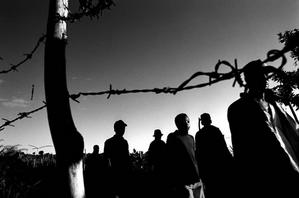Home > "The Price of Sugar": The enslavement of Haïtian Workers
"The Price of Sugar": The enslavement of Haïtian Workers
by Open-Publishing - Friday 23 November 2007Agriculture - Fishery - Animals Poverty-Precariousness South/Latin America
"The Price of Sugar" (thepriceofsugar.com) follows a charismatic Spanish priest, Father Christopher Hartley, as he organizes some of this hemisphere’s poorest people, challenging powerful interests profiting from their work. When he arrives in the Dominican Republic, he’s warned against entering the sugar plantations where most of his parishioners live. Breaking a centuries old taboo, he discovers shocking examples of modern-day slavery intrinsic to the global sugar trade.
On an island known for tropical beauty, tourists flock to escape winter and relax with little knowledge that just a few miles away thousands of dispossessed Haitians are toiling away in unseen plantations harvesting sugarcane most of which ends up in the United States.

Cutting cane by machete, they work 12 hour days, 7 days a week frequently without access to decent housing, electricity, clean water, education, healthcare and adequate nutrition. Often they are stateless, with neither Dominican nor Haitian identity and virtually invisible in the eyes of the law.
“The Price of Sugar” raises key questions about where the products we consume originate, at what cost they are produced and ultimately, where our responsibility lies.
Press : "The Dominican government has effectively barred Haitian migrants and their Dominican-born descendants from attending school, owning property and working - by denying them the precious right to a legal identity. Their future depends on the government’s willingness to adhere to a recent international court ruling." -Michelle Garcia, Amnesty International Magazine, Fall 2006
"The Haitian workers, then as now, typically live in bateyes - company towns located within the sugar plantations. Some have electricity. Most lack running water. There are no phones, no playgrounds, and no mattresses on many of the rickety beds. - Danna Harman, The Christian Science Monitor, February 1, 2006
"Aside from hunger, a common complaint voiced by the workers is their mistreatment by plantation foremen from insults to beatings and even being locked in fertilizer sheds for trying to escape. Other complaints focus on the deficient and often nonexistent medical services." - (Gerardo Reyes, The Miami Herald, March 8, 2005)
http://internationalnews.over-blog.com/article-14016643.html




